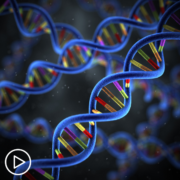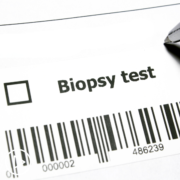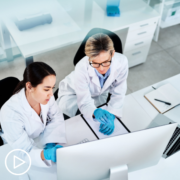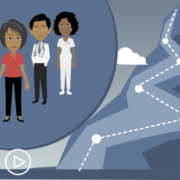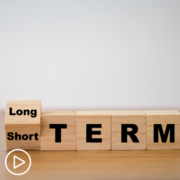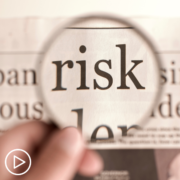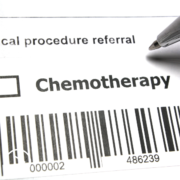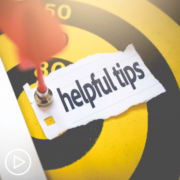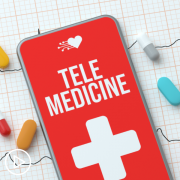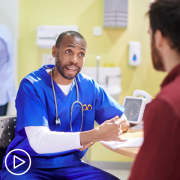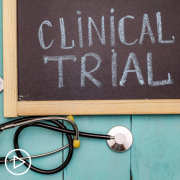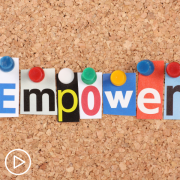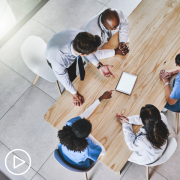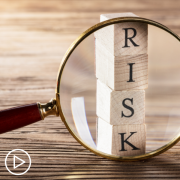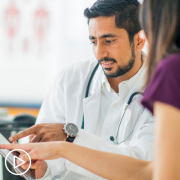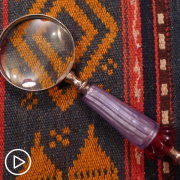AML expert Dr. Ann-Kathrin Eisfeld reviews the importance of essential testing and explains how the results may impact the care and treatment of patients with AML. Dr. Eisfeld also shares updates on new and developing AML research.
Dr. Ann-Kathrin Eisfeld is Director of the Clara D. Bloomfield Center for Leukemia Outcomes Research at The Ohio State University and a member of the Leukemia Research Program at the OSUCCC – James. Learn more about Dr. Eisfeld.
See More from the Empowered! Podcast
Transcript:
Katherine Banwell:
Hello and welcome. I’m Katherine Banwell, your host for today’s webinar. Today’s program is a part of our Insist series. We’ll discuss how to access the most personalized AML therapy for your individual disease and why it’s vital to insist on key testing. Before we meet our guest, let’s review a few important details
The reminder email you received about this program contains a link to a program resource guide. If you haven’t already, click that link to access information to follow along during the webinar. Before we get into the discussion, please remember that this program is not a substitute for seeking medical advice. Please refer to your healthcare team about what might be best for you. Well, let’s meet our guest today. Joining me is Dr. Ann-Kathrin Eisfeld. Dr. Eisfeld, welcome. Would you please introduce yourself?
Dr. Eisfeld:
Hi, thank you so much, Kathrine. Yes. My name is Ann-Kathrin Eisfeld. I’m currently an assistant professor and hematologist at the Ohio State University.
And I’m also serving as the director of the Clara D. Bloomfield Center for leukemia outcomes research at the James.
Katherine Banwell:
Thank you so much for joining us today and taking the time to discuss this important issue. To set the stage for today’s discussion, Let’s start with this important question. How would you define personalized medicine as it relates to AML care?
Dr. Eisfeld:
I define personalized medicine in AML as have a complete testing at time of diagnosis that consists of not only the morphology of the bone marrow, but we call immunophenotyping, which is looking at the surface markers, but also full review of all the chromosomes, which is called cytogenetics. And with those metaphase testing, I’m looking really at all of them and at the hot spots, which is done by a technique called FISH.
And then most importantly, for personalized testing, it also needs to consist of testing the most common, recurrent gene mutations. Changes in the tumor DNA that we know are contributing to the disease biology and also to the response of the leukemia to different genes.
Katherine Banwell:
Thank you for that, Dr. Eisfield. That helps guide us as we begin our conversation.
I imagine that personalizing therapy for a patient requires a number of tests and then thorough review of the test results. Could you provide an overview of the tests necessary to help understand a patient’s specific AML?
Dr. Eisfeld:
Yes. Absolutely. There are multiple things that go in. And let me –even before we go into the tests – point out one thing. Because as we talk about individualized care – and it is also important to keep in mind that it will be also dependent on the age and of the performance status of the patient.
Because we know that all the changes that are going to be reviewed might be more or less severe depending on really the age of the patient we are discussing. The most critical aspect for every AML patient is a bone marrow biopsy and a bone marrow aspirate on which the testing that I have been referring to are performed.
One, it gives us information about how the – after review of the hematologist, it gives us information about the specific kind of the leukemic cell.
And very importantly – and this is a very more recent development that we know about that’s important. It also tells us whether the acute leukemia is really happening as an acute leukemia or whether the patient without knowing it before might have had a precursor issue. And this is something that by now really in just about half a year we can use in addition to direct treatment.
So, it seems like an ancient thing that we think that the microscopic review is important. But that is one part of it.
The second part – and this is, again, all based on the bone marrow biopsy. The inspection of chromosomes, as I mentioned, may be called cytogenetics. This test takes longer. It sometimes takes up to two weeks to result. And similar, looking at the tumor DNAs and mutations that is done either if you’re at a large institution such as Ohio State or other cancer centers. It’s done in house. Whereas at smaller institutions, it would be done by a sent-out testing that has these recommended gene mutation testings done. And some of those result just within a couple of days.
And these are – but we can talk. And I know we are going to talk a little bit more about it later, but we now have targeted therapies available. This is a really super exciting topic we couldn’t have talked about just even five years ago. And those mutations and those DNA changes come back usually within three to five days.
So, that we are able to decide on treatment.
Katherine Banwell:
How can someone ensure they’re getting an accurate diagnosis?
Dr. Eisfeld:
That’s a very good question. I think the most important part is to go to somebody who has seen acute leukemias as a living. It is a very rare cancer as you know. And if you are seen even by a general oncologist who might be a fantastic oncologist, he might just see one or two cases per year. And thus, might not be up-to-date on the newest recommendations. So, I can just advise anybody – even if he lives further away and trusts his physician a lot – to – for the diagnosis and for treatment planning, come to a comprehensive cancer center, at least for a therapy planning. Because what is now possible is many of these treatments is that we can just give advice.
And then you can still receive treatment in some cases really back at home. But be sure the testing was done correctly. And really give you every option to take into consideration what the best treatment would be for you, what the best treatment is for the patient. Having this trip – which can be hours of a drive. And I appreciate this. Having that done once would be, I think, the best thing to do.
Katherine Banwell:
Many cancer types are typically staged. But that’s not the case with AML. AML is often considered low risk or high risk. Is that right?
Dr. Eisfeld:
Yes. And we – I think that’s very well how you put it. And we can even – they even add an intermediate risk by now to it. And I love this question because that’s what I like to study or what I’m studying here. The one important thing to keep in mind – and this is something even many hematologists don’t think about is that the risk assignment of acute leukemia, of AML if you think about it as low, or high, or intermediate risk is risk – or is actually better said not risk, but chances to respond to conventional chemotherapy. So, the way all this was defined is that if you have, for example, a multitude of chromosomal abnormalities – as you call it complex karyotypes – it would be considered adverse. This means your chances of responding to the standard of care in terms of chemotherapy are very, very low.
And similarly, if you have other changes such as a NPM1 mutation, your chances are considered very high. And but – so, the risk assignment with the increase of treatments now changes. We still also – and when I look at that, I think about it in the same way. But in my mind, if I’m talking to a patient, I’m trying to make sure to say, this is considered an intermediate or adverse risk.
But this means that I would not, at the first place, consider you for a standard chemotherapy but rather advise you to participate in a clinical trial or have an alternative care. The second implication especially for younger patients would be to – if you’re intermediate or adverse risk, that you would routinely be considered for bone marrow transplant or stem cell transplant.
Katherine Banwell:
Okay. So, what does it mean to be high risk then?
Dr. Eisfeld:
It means that your likelihood of going into remission – the standard of care is very low. This means – I mean, in very practical numbers, it might be as low as 20 or 30 percent. This meaning getting the leukemia into remission, there are very important differences. The first step at every time in the same high risk means if the patient receives the treatment, how high are the chances that we can get rid of the leukemia?
The second question is how high are the chances once it’s gone that it stays away? Or how high are the chances of relapse? In adverse risk most cases, it’s both – a combination of those. The chances of going into complete remission are lower and the chances of it coming back are higher. So, we have to be very aggressive. This means that we have to consider alternative treatment options. And even if we are then lucky and achieve remission, that we might have to move to more intensive additional treatments such as a bone marrow transplant.
Katherine Banwell:
Dr. Eisfeld, the landscape of AML has changed significantly in recent years. How have advances in testing improved patient care?
Dr. Eisfeld:
It is a different world, Katherine, honestly. I mean, I started practicing in hematology in taking care of AML patients back in Germany actually in the year 2007.
Back then, there was no other testing that was available. All we were guiding and all that we had available was morphology and cytogenetics. And very often, it was very inaccurate. And we also only had two treatment kinds available. One was intensive chemotherapy, and one was something that was just a little bit better than best supportive care. So, many patients could not receive treatment. And the increase in knowledge that we have on a molecular level in AML really did two things at once. On one, we understood we had a more fine tuned understanding on which patients would respond. And the second thing is that this knowledge about the molecular landscape enabled us to have new treatments available that are sometimes in pill form that can target specific mutations in patients who carry these genetic changes.
Katherine Banwell:
Should all AML patients undergo in-depth testing like biomarker testing or cytogenetics?
Dr. Eisfeld:
Yes. Every patient should do that. It can make the difference between life and death. And it can make the difference between receiving – having a hospital stay of four weeks with intensive chemotherapy versus taking the pill at home. This is very rare that this is possible. But it is possible. And of course, you – one would not want to miss this chance if it would be possible.
Katherine Banwell:
With all the new tools that are available, what other factors do you consider when working with an AML patient to choose a treatment approach for them?
Dr. Eisfeld:
The most important aspects are what we call – and this is – I’m glad that you bring this question up because I feel you have to think of – and that was what we’ve been talking about – called disease-associated factors. This is everything in the leukemic cell. They – how does a leukemia looks like? How does the blast look like? What changes are there?
That’s the biggest part of what I would call patient-associated factors: the patient age, the patient performance status, actually the patient. In every – because I think, sometimes, we forget about it. But we just look at all the molecular testing.
But even if – for example, there would be a patient with a very good risk leukemia, where I think, “Oh, this leukemia should respond very well to an intensive chemotherapy.”
If the patient cannot tolerate chemotherapy or – and I see it more often than I would wish for patients who are young who have a great performance status, but they just cannot – they – their family reasons. Small children sometimes – they just cannot be away for so long. This all comes into consideration. So, it’s really important because we all work together as a team. And the right treatment for the leukemia might not be the right treatment for the patient.
And for most cases, however, I think, it will only work if one stands with a whole heart with those physicians, and patients, and family. Because it’s a long journey behind the care that’s being given. And so, this is a joint decision-making, and there are different options that can be done. Of course, I would not advise something where I would think there are no chances of success.
And so, this has to be an open discussion. But this is – it’s very often a very tough treatment to communicate that and see what are the goals of each patient? That will be most important for treatment and decision-making.
Kathrine Banwell:
Dr. Eisfeld, we’ve been discussing treatment choices and how they vary for individual patients. What types of AML treatment classes are currently available?
Dr. Eisfeld:
This is a very good question. The most classic treatment class is intensive chemotherapy. This is just because people might have heard the names. It is called 3 + 7 or 7 + 3, which refers to one weeklong impatient chemotherapy treatment. But you get one chemotherapy for seven days. And the first three days, you get a second treatment as well.
That’s why it’s called three in seven in here, but it’s a total of seven days. So, we have intensive chemotherapy. And there are different flavors of it. But this is usually the backbone. The second class is what I would call a targeted inhibitor. And here we can look at two different aspects. We have target inhibitors for a specific DNA mutation that are found. And specifically, one are called IDH or FLT3 mutations.
And these are pill forms that I usually by now combined with a third drop class which is called hypomethylating agents. And I will go through in a moment.
But these are pills that really only work in patients and carry that genetic change. They have very, very low toxicity and very high chances of working. So, that’s why this testing is so important to see if one is one of the 15 percent of AML patients carrying an IDH mutation – 15 percent isn’t low. And a similar rate carries a FLT3 mutation.
And then there is also going to target inhibitors. That is targeted because it is against what I would call a pathway. The gene that is commonly activated in acute leukemia – and this is called BCL-2 and the drug is called venetoclax (Venclexta).
This is now stormed through the acute myeloid leukemia world in just a few years ago and has been approved as a front-line treatment option for several patients, especially for those who are older. And we know that even patients who respond usually favorably to chemotherapy, some of those also respond well to venetoclax the Bcl-2 inhibitor. The benefit is that this treatment in many cases if it works, can be done as an outpatient in here and has very often lower complications.
It is actually has so good results that I – sometimes it seems too easy. So, we actually advise patients to still try to get – the first time they get the treatment, do it at a center where it’s done more commonly. Because it sometimes – don’t underestimated the power of a pill. And it’s still a very, very powerful drug. So, doing it in a controlled setting – because if cancer cells break down, they break down and can create all sorts of trouble.
So, that is really something – for several leukemias, it can be concerning. And again, now the treatment group would be called hypomethylating agents. The names are azacitidine (Vidaza) and decitabine (Dacogen). And they act in a very different way. They try to change the epigenetics like methylation patterns. And often, if it is an untargeted way of the tumor cells and they can be used alone.
Or very often by now in combination with the targeted inhibitors that I was just mentioning. These are infusions that can be done either over five, seven, or 10 days depending on the combination treatment. And for patients, as I mentioned before, that don’t respond well to many other options to those patients with a complex karyotype. This is, for example, a scenario where patients can just receive this as their only therapy.
Katherine Banwell:
What about stem cell transplant? You didn’t mention that.
Dr. Eisfeld:
Yes. That would be the next one. So, stem cell transplant always comes as an option, which I would call as a maintenance therapy. Again, two aspects. We have two different end goals.
First is get rid of some leukemia. Second is to make sure it stays away. And as soon as the leukemia is in complete remission, depending on the performance status – the agent. Again, in multiple different things. It’s not an easy decision.
At that time, there has to be a conversation. And that always involves a leukemia physician and a transplant physician very often. These are different providers that goes for the risks and benefits. Where the question is if I only continue to do chemotherapy – because it’s never only once. You would always have to repeat your chemotherapy. What is the likelihood that the leukemia comes back, and does it outweigh the risks that comes with the stem cell or bone marrow transplant that comes in here. But for many leukemias, especially for young patients and for patients with higher risks, this is the only chance of a cure. That is the most curative and only curative attempt for many leukemia attempts.
Katherine Banwell:
Where do clinical trials fit into the treatment plan?
Dr. Eisfeld:
That is the absolute backbone. We always have to think about that.
Everything – all the treatment options that I mentioned – have been clinical trials, just very, very short time – very few years ago. So, every patient that comes to a leukemia or a cancer center, clinical trials will be discussed if they’re available. Because they will provide a special opportunity to have even more fine-tuned treatments – either newer agents. And I think what is very important to mention is that all clinical trials that are available would give the option of the best standard of care. And then the hope that a patient wouldn’t be getting any of the best standard of care options that are approved. The hope is that the new agent or added agent in many cases would even do better.
It’s also important that there’s a lot of additional monitoring during the trial. I think it can be seen in two ways as two parts of a coin. In one way, it may be additional visits to the hospital or additional blood draws that are necessary to be sure that the medications are safe, and that researchers and conditions can learn about it. But on the other hand, it also gives you this extra bit of being looked after and really getting checked in and out, making sure that all organs are functioning that everything is just going fine. And many patients appreciate this a lot. And they have this pair of extra eyes on them all the time.
Katherine Banwell:
Dr. Eisfeld, what therapies are available for AML patients who relapse or don’t respond to initial therapy? And is this treatment approach different from those who are newly diagnosed?
Dr. Eisfeld:
Most of the time, the treatments available at relapse are the same available at the first diagnosis. Just because we know now that, for example, if you have a molecular marker that, for example, is available, it would act with also relatively high chance of relapse upset. However, at relapse, the most important thing I personally would do is consider a clinical trial even stronger than in the first mindset.
Because it means that the leukemia outsmarted current treatments very often. So, usually what we would be doing is see if there is a targeted inhibitor or a cell mutation FLT3 or IDH, which I would personally always prefer to go in MLL rearrangement now for the new menin inhibitors where one would go with the same option as if it would have been their diagnosis. But if not to really consider clinical trials is a strong urge.
Katherine Banwell:
Should patients or should relapse patients undergo genetic testing again? Is it necessary?
Dr. Eisfeld:
Yes. At any time. Yes. Because we know that the leukemia changes. And you just can think about it in the way is that the cells that are surviving treatment, they’ve become smart. There was so much poison. There was so much treatment put on them.
And the ones that survive might have a quiet additional chromosome change as additional gene changes. And even if a genetic change has not been present at time of diagnosis, the reason the cell has survived might have been that it has now one of these changes that came up on a later time during treatment or while the cell is hiding somewhere to come back.
Katherine Banwell:
Are there therapies in development that are showing promise for patients with AML?
Dr. Eisfeld:
There are so many of those. It’s hard to count. And this makes me very happy. There are exciting and again, targeted drugs.
Once drug class is called menin inhibitors, which we – which were just published that show high promise.
And again, very difficult to treat several groups of patients who harbor chromosome changes in MLL genes in here. So, that is a very exciting option.
And there’s very exciting treatments with respect to what you call antibodies – monoclonal antibodies that protects the surface proteins that are being checked regularly. And one of those, for example, is called magrolimab. And that has even promise in these high-risk leukemias or adverse risk leukemias.
And then we are not there yet, but I’m sure we will be in the not too near future. There are also multiple trials that are looking at what we call CAR-T cells. But patients might have heard about for lymphomas or acute lymphoblastic leukemias. AML is a little more tricky with respect to those.
But we’ve seen pre-clinical studies that look really exciting. And I think it’s just going to be just a little more fine-tuning to make those easier, available, and more targeted for AML patients. And I’m very much looking forward to seeing those come more onto the market.
Katherine Banwell:
You mentioned the new menin inhibitors. Who are they right for?
Dr. Eisfeld:
We try to find out more, but definitely for patients that have been shown to be beneficial for patients who have chromosomal and rearrangements of the MLL gene or KMT2A gene. And there’s also good data on patients who have NPM1 mutations.
Even though we know – and these are mutations who harbor this kind of genetic change – have now a plethora, which is a great, of treatment options.
Because we know even conventional chemotherapy has been working decently well in them. We know that venetoclax also is supposed to work very well in them. But again, the data on the menin inhibitor with respect to NPM1 mutations is very exciting.
Katherine Banwell:
So, Dr. Eisfeld, we’ve covered a lot of information related to AML care. As a researcher, what other topics are currently top of mind for you in the field of AML? What are you passionate about?
Dr. Eisfeld:
Again, so many parts. I think there are probably three main things that I’d like to name. And I think about it as a little bit outside the box. Most of what we know about AML, we have become so much better. It’s because we have been studying patients who were treated over the past decades on clinical trials and very often here in the U.S. or in Europe.
But all clinical trials have a bias in that most of them have been done A) on patients who are younger than the age of 60. And B) fewer patients of other races and ethnicities included. And had patients not included that have AML, for example, not only in the bone marrow but on extramedullary sites – how we call it – up to 10 percent of their patients. And also, very often have not been done on very old patients where the AML is very common. So, all the patients – patients from other race, ethnicities, or underrepresented minorities, and patients who present with extramedullary disease are currently in my – underserved.
And these are exciting areas and opportunities of research and of active clinical practice. Because those are the patients we need to include if it’s possible now to include them in clinical trials.
If there are no trials available, then make sure any other additional molecular testing it done to understand them better and to advance our disease knowledge that we make sure that we can give the best possible care.
Katherine Banwell:
I think that the most important part is to get the molecular testing, and to enroll into clinical trials, and then to very often biobanking.
Why am I saying that is because our knowledge AML comes from patients who donated some tissue so that we could learn – researchers decades ago could learn about the genes. We know that leukemias differ so much in between patients.
So, I am worried that we are yet missing out on potentially important genes that need to be discovered and where we could develop docs for. This will only be possible with these additional testing.
The second part is to really consider going to larger treatment and larger treatment cancer center. And there are support systems in case that can help in here.
And the third part is to get involved even as early as possible even if you’re not personally affected, with Be The Match – with bone marrow transplant because there’s a paucity of donors, of people of color that makes it harder for these patients to get a potentially curative treatment in here.
We have other options now in bone marrow transplant where one can use only half-matching donors and or other availabilities. But again, that doesn’t outweigh that the bone marrow and donor registry that we need to get better at.
And I can – there are just so many factors – such a high degree of structural racism that affects people from every corner. And I think we as physicians, as society, and everybody need to acknowledge that. And we have to make sure that we get better to, again, give every patient the best care and keep the patient in mind and see what’s right for them at the right moment.
Katherine Banwell:
Where can patients or people who are interested find out about being a donor?
Dr. Eisfeld:
There is the website called “Be the Match” that one can put in. This is probably the best way to get first information.
And usually, at all the cancer sites. And sometimes, there is information at lab donation places, universities, either or the American Red Cross.
Usually those places have information laid out there as well.
Katherine Banwell:
Dr. Eisfeld, before we close, I’d like to get your thoughts on where we stand with progress in the field of AML. What would you like to leave the audience with? Are you hopeful?
Dr. Eisfeld:
I am incredibly hopeful. I hope – when I started working in hematology, as I said at that time, it was just about when imatinib (Gleevec) came out. Which is this CML pill that really revolutionized care. And so, at that time, I would be – all patients on that bone marrow transplant service had chronic myeloid leukemia. And because they all had to undergo bone marrow transplant. Then Gleevec came, and today, there are no such patients who are see or very rarely that require such intensive care.
So, I am very hopeful that in my practice time, which hopefully –and even earlier on – that there will be a time where we find targeted therapies for almost all patients.
Katherine Banwell:
Dr. Eisfeld, thank you so much for joining us today.
Dr. Eisfeld:
It’s an absolute pleasure. And if there are ever any questions, please feel free to reach out. For patients who reach out, we are there to talk to all of you and give advice as good as we can or put you in contact with the right people.
Katherine Banwell:
Thank you. And thank you to all of our collaborators. To learn more about AML and to access tools to help you become a proactive patient, visit powerful patients.org. I’m Katherine Banwell. Thanks for joining us today.
